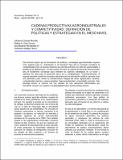| dc.contributor.author | Chaves Murillo, Johanna | |
| dc.contributor.author | Díaz Porras, Rafael A. | |
| dc.contributor.author | Hernández H., Ana Beatriz | |
| dc.contributor.author | Hidalgo Flores, Orlando | |
| dc.date.accessioned | 2020-09-30T00:31:37Z | |
| dc.date.available | 2020-09-30T00:31:37Z | |
| dc.date.issued | 2000-06-01 | |
| dc.identifier.issn | 2215-3403 | |
| dc.identifier.uri | http://hdl.handle.net/11056/18273 | |
| dc.identifier.uri | https://www.revistas.una.ac.cr/index.php/economia/article/view/6832 | |
| dc.description.abstract | Este artículo expone que la formulación de políticas y estrategias agroindustriales requiere crear espacios para su articulación en el mesonivel. Para ello es necesario considerar la competitividad como un proceso sistémico que permita enfrentar con éxito las oportunidades y desafíos de la globalización. En éste sentido, la visión de cadenas productivas internacionales será el fundamento conceptual para entender las opciones estratégicas de un sector y clarificar los retos para el desarrollo futuro de su competitividad. Consecuentemente, el segundo apartado reseña los conceptos relevantes para la articulación pública y privada como una alternativa para iniciar la transformación integral del sector agropecuario nacional: competitividad sistémica, cadenas globales, hipercompetitividad y el portafolio sectorial. Este abordaje teórico se refuerza con tres estudios de caso claramente diferenciados que permitirán concluir con respecto a la aplicabilidad futura de éste enfoque teórico. | es_ES |
| dc.description.abstract | This article exposes that the formulation of agro-industrial policies and strategies requires creating spaces for their articulation at the meso-level. For this, it is necessary to consider competitiveness as a systemic process that allows successfully facing the opportunities and challenges of globalization. In this sense, the vision of international production chains will be the conceptual foundation to understand the strategic options of a sector and clarify the challenges for the future development of its competitiveness. Consequently, the second section reviews the relevant concepts for the public and private articulation as an alternative to initiate the integral transformation of the national agricultural sector: systemic competitiveness, global chains, hypercompetitiveness and the sector portfolio. This theoretical approach is reinforced with three clearly differentiated case studies that will allow us to conclude regarding the future applicability of this theoretical approach. | es_ES |
| dc.description.sponsorship | Universidad Nacional, Costa Rica | es_ES |
| dc.language.iso | spa | es_ES |
| dc.publisher | Economía y Sociedad | es_ES |
| dc.rights | Acceso abierto | es_ES |
| dc.source | Economía y Sociedad vol.5 no.13 5-18 2000 | es_ES |
| dc.subject | POLÍTICA AGRÍCOLA | es_ES |
| dc.subject | AGRICULTURAL POLICY | es_ES |
| dc.subject | AGROINDUSTRIA | es_ES |
| dc.subject | AGROINDUSTRY | es_ES |
| dc.subject | SECTOR AGROPECUARIO | es_ES |
| dc.subject | AGRICULTURAL SECTOR | es_ES |
| dc.subject | COMPETITIVIDAD | es_ES |
| dc.subject | COMPETITIVENESS | es_ES |
| dc.title | Cadenas productivas agroindustriales y competitividad: definición de políticas y estrategias en el meso nivel | es_ES |
| dc.type | http://purl.org/coar/resource_type/c_6501 | es_ES |
| dc.description.procedence | Escuela de Economía | es_ES |

